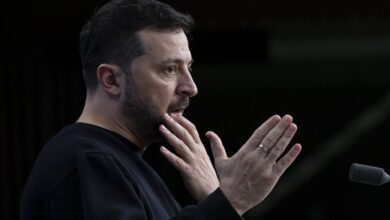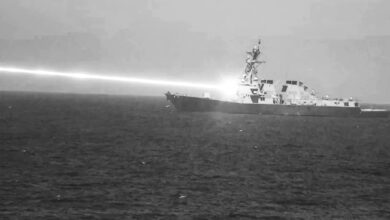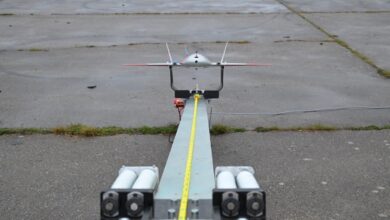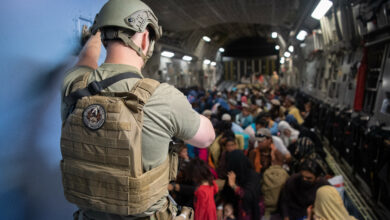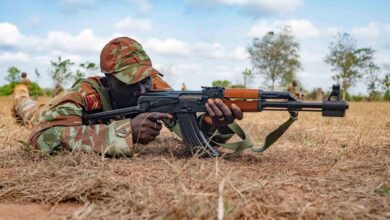
Jake Hanrahan wants to fix conflict reporting. A U.K.-based, self-taught documentary filmmaker and journalist, he launched Popular Front this year to bring the niche details of modern warfare to a new audience: everyone. Hanrahan spoke to The Defense Post about the podcast, his ambitious plans for Popular Front and the underground experts who drive it.
Q: What’s your background, and how did you decide you wanted to make this podcast?
I’ve been doing journalism for five or six years, and I started off just doing print. I kind of taught myself; I didn’t do uni or any of that stuff, but I just knew I wanted to do journalism, so I started off just reading a load of books by journalists I really like: Evan Wright, Don McCullin, Dexter Filkins, journalists that I think are great.
I started writing because it was the only thing at school that I was any good at. I left with no GSCEs, but I thought if I can somehow make writing work, I’ll be happy. I was freelancing while also working odd jobs everywhere: building sites, a suit shop, all that stuff. Eventually after about a year of writing for free almost, I started getting published. I got a big piece in the Guardian, and then a few other places. And I just kind of fell into it like that.
The Guardian piece was really interesting. When the Tunisian revolution was happening, there was a gang of skaters, and I used to skate, so I loved this story.
These skaters went into one of the corrupt politician’s mansions, and they started smashing bits of it down, and turned his swimming pool – this big, luxurious swimming pool he had off of his ill-gotten gains – into a skate park and they just started skating in this mansion.
But I always wanted to get into docs. I thought I must get into docs because I absolutely cannot make a living off of print journalism and I don’t want to be an editor. When I write, I’m very slow. I like to spend ages on it.
So then Vice News started, and I had been writing for Vice a little bit on the side, but when I saw the trailer for Vice News I was like, “That’s everything I like about Vice in one place. That’s without all the stupid dildo articles or whatever.”
I just bugged the editor there, Kevin Sutcliffe, he was excellent. I guess he just gave me a chance, and I came on as a researcher, and the first day, he was like “Do you want to do docs?” And I was like, “Yeah, eventually.” He was like, “Fuck it, let’s do docs.” And within a month or two I’d made my first doc as an on-screen correspondent, and I absolutely loved it. And for four years I was there and it was just amazing.
Unfortunately Vice News went mainstream. HBO bought them out and in my opinion it just became much more of the same. And also it became too political. When we did Vice News, when it was good, there was none of that. You just go, you tell the story. Don’t worry about the moralizing, we just put the truth out and that was it. And I felt like that vanished a bit.
Kevin left and a new boss took over, and he told me I was unmanageable and I said I didn’t want to be managed by him, and then we kind of came to an amicable decision: I left.

Q: Vice was known as “Here’s a bunch of guys who are going to take a bunch of drugs with warlords, and how that speaks to the greater whatever in Uzbekistan.” Have you found any difficulty with that background?
There was no taking drugs with warlords in Vice News. That was before, that was when it was Shane [Smith] running around doing things. I think we did a hell of a lot of good work, and it was obvious.
People started copying our style, even BBC started changing up the way they did things. We got a lot of flak as well, which is to be expected because journalism is kind of stuck in its ways. When I came out I had a different mindset towards journalism.
What has hindered me is just having to play the game all the time. There’s a lot of hoops you have to jump through, so that has been a struggle, but having the background has helped because I did a hell of a lot in a very small amount of time. I was 24 when I started at Vice News, I’m 28 now and I’ve done so much. I’ve been all over the shop, and I’ve done all these different docs. At any other place, like BBC for example, you’d probably still be making tea after four years. At Vice News you could just get in and go. It was excellent.
Q: What do you see as different now for journalists trying to get their foot in the door?
I think a lot has changed. I’ve seen so much change in the last two years to where it’s almost unrecognizable.
I think now conflict journalism or ‘hard news’ is not doing so well. It’s not making money, and that means that a lot of the people in power – the editors, the commissioners – are not taking any risks. I don’t mean risks like danger itself, I mean not go out on a limb. They just want to do the same stuff, talk about Trump. That’s what’s popular, so just keep doing it, and forget about kids perishing in Yemen or wherever.
Not to say that there isn’t still some great conflict journalism going on. There is, absolutely excellent, and there are a lot of places still doing it, however I think they’re not broadening. They’re not moving forward.
Q: When did you launch Popular Front and the Patreon campaign and how has the response grown since then?
I had the idea in January; I was asking on Twitter, saying to my followers “Do you think this would be a good idea or am I an idiot? Would this be too niche?” And when I spoke to all the people who I wanted to have on it they were like “Do this. You have to do this.” And there were a few people who were like “lol everybody wants to start a podcast ‘cause it’s the new year,” and that put me down a bit in a way.
Then I recorded one episode just as kind of a tester with Pascal Andresen. We did the Nazis in Syria episode, and people were kind of like this is weird, but it’s good, you should do more of it.
I launched it in May and straight away I launched the Patreon because it was costing me money to pay for the space and various other things – I had to buy a mic and things like that. The response for the first month was quiet, but I met Joey L (the photographer Joey Lawrence) and did the Rojava episode with him and he was really supportive. I liked him a lot, he’s a good guy, and he was like “Look man whatever you’re doing here it’s different and it’s cool and you should do it more,” so that spurred me on.
Last month all of the sudden I just noticed the numbers – at the start of July it was 8,000 and now it’s 50,000 unique downloads in the space of a month, and that came with no corporate thing, no money behind it. I think that’s pretty good.
The podcast is completely listener funded. I started a Patreon. I gave them these dumb names in the start because I didn’t think anyone would even look at it. It is a bit embarrassing.
Foot Soldier is the first one. It’s $1 support, which is useful, because imagine if 10,000 people wanted to pledge $1. You’d be making stuff every week. And then there’s Bonus Guerilla [$5/month]. I do bonus episodes two or three times a month, which vary from having guests on to me rambling about stuff I’ve been doing in my career. There’s one for $10 where I started doing narrated articles. I’ve written a lot in the last 4-5 years and a lot of it coincides with what we’ve been covering on Popular Front, so I’ve been recording audio versions.
The biggest one is $30 a month – I just put that in there because I thought it would be cool if anyone wanted to do it, but there’s 13 people in there now which is really cool. I put everyone’s name in the episodes as credit, because without those guys I wouldn’t be able to be putting episodes out as often.
Also, I said in there that people [in that tier] would be consulting in the editorial process. I want to start doing news dispatches and docs, and I’m going to start hitting people up and sending rough cuts, things like that. I think that’s important, to have everyone involved. That’s what I really miss from Vice News. When I was there it was a team effort. You’d get input from everybody, and I want to recreate that environment.
I started Popular Front four months ago with no backing and no money and it’s just hit 50,000 unique downloads. Thanks all. Listen to Popular Front. https://t.co/dkkUqYAwGP pic.twitter.com/B2LKi0AkSh
— Jake Hanrahan (@Jake_Hanrahan) August 18, 2018
Q: You reached that tipping point. Suddenly everybody seemed to notice it and because everybody was noticing it, everybody else was noticing it.
Yeah, I don’t know what happened. I mean, [British pop star] Lily Allen, I don’t know if you saw that. She was listening to it and she put up this thing on Instagram but I dare say there’s not much of a crossover between her audience and a niche warfare podcast. I guess people just liked it.
The best thing is I had people contact me and say “I’ve been wanting something like this, I’ve been wanting this to happen, and I’m glad you did it and thank you.”
I think it’s not particularly me, it’s the people I have on, and people didn’t realize before that these people exist. They’re just normal guys, normal women as well, who are just interested in this stuff and they’re working on it quietly in the background, and if you get them to talk about this, it’s just wow – it’s an education.
They’re so passionate. They’re not doing it for the money, they just want to talk about it.
Q: You initially pledged when you hit $500 a month in support you would start doing an episode every week. Have you hit that goal?
Yeah, unfortunately. [Laughs] When I started that on Patreon it said put some goals in, and I was like “$500 a month and I’ll start doing it weekly. I’m not ever going to get to $500 a month but whatever.”
Then within a month or two it hit $500 and I’m like “Oh God.” I don’t think I realized how much work it was going to be, editing long episodes, putting them out every week, but so far I’ve managed it. I’ve been doing like two-a-week recording, spending my weekends editing them, and then I put them out in a week. So far it’s been working.

Q: But that’s huge – you launched it in May, and it’s August, so you’ve got that much support and it’s grown from nothing in the space of a few months. What do you think is resonating with people?
That is a good question. I think it does help that I had – I hate the word – a platform. I had a following beforehand. People have seen my docs over the years, and I don’t want to dwell on myself but I think people like the way that I am. When I’m doing docs I’m the same as when you meet me on a Friday in the pub. I try to just be me. I think that’s helped, because people know that it’s just no-nonsense.
The kind of catchphrase that I’ve written on there is “No frills, no elitism,” which means I want it to be basic. I don’t want it to be stupid fancy and I also don’t want any elitism involved at all because I’ve been battling that my whole career. I think that resonates with people because nobody wants to be talked down to or patronized and at Popular Front I’d be very surprised if you felt patronized from listening to the podcast.
Q: Why did you choose to focus on the niche details of warfare? It is fairly limiting, isn’t it, to say you’re not gonna broad stroke anything. You’re going to have to find an expert in all kinds of crazy topics to keep this thing going.
That is true, but everyone is doing the broad stroke. You don’t have to fit everybody in, it doesn’t matter if one person goes “Oh, I don’t get that.” That’s fine. They might get it if they listen to it.
It’s a really weird thing now in journalism where they’re trying to create things that everybody will already know about. You’re meant to create things that people don’t know about, because then they learn. You inform them. So for me, it’s a no-brainer. Everybody loves feeling like “Oh, I didn’t know about that. I know about that now.”
That’s all I’ve ever wanted to do in my career. I just want to make people go “Oh, shit, I don’t know about that” and that’s it, that’s all you’re meant to do.
So it is very niche but you’re not going to come to the podcast and be like “Yeah, I knew that.” That’s my aim, anyway. I want to make people go “I didn’t know about that” and that’s it.
Q: What do you think is the biggest thing missing in conflict journalism right now?
Under-reported stories – I would say that because that’s kind of my thing, but I do think under-reported stories are very important. For example, when I did the Kurdistan stuff in Cizre and southeast Turkey no one was really doing it. That was kind of cool, and people loved that.
There is this perception that a lot of elitist commissioners give off like “Oh, no, people don’t care about that.” They do. How is some guy who’s earning like 100-grand a year, who lives in Primrose Hill, never goes out in London, how the hell is he going to know what normal people want?
Normal people want good stuff. If it’s good, they’ll digest it for as long as they can. In my opinion that’s just common sense.

Q: Knowing that, why did you decide to launch a podcast that basically relies on listener support?
I’m questioning that myself. [Laughs] I think I just wanted to create something. I always had in my mind that I wanted to do this. I’m ready now, let me try and start my own thing. Now, I don’t have any money so what can I do?
So then I was just like, let me do a podcast because people love it. It’s one of the few mediums where people will sit for two hours and listen without messing about or turning it off – at least that’s how I listen to them a lot of the time.
These weird little Twitter communities that I’m a part of go into very deep detail about this stuff, just chatting to each other, sharing information and talking to lads that have been spending weeks and weeks and weeks on their days off documenting ‘which fuse was used in this bomb,’ and I found it so interesting.
And I remember thinking, I wish I could have included some of this stuff in my old documentaries. So then I thought let me give these guys a platform and a voice as well, with Popular Front. Let me make a podcast about these niche details of war.
I thought at the start that it was going to be a little thing on the side, and I thought let me set this Patreon up and it might be able to pay for the server costs just so that it isn’t a black hole. And then all of the sudden it’s kind of blown up really, it’s surprising.
I’m really proud – no, I’m not proud, that’s ridiculous. I’m really happy that’s it’s blown up because it’s proved one of my theories right, I think, that normal people just want good content. Most of the people who contact me are not even from the kind of communities that I am about, they’re just normal people who are like, “Oh this is great.”
A guy contacted me the other day and said “This is the best news. I rely on this for my news and this is the best.” And I’m like, “This isn’t news,” but if people are being informed, and they like the format, then maybe they see it as news. I feel like I’ve created something semi-original, which I am quite happy with.

Q: I like that it actually respects the audience. You get somebody like Hugo Kaaman or Pawel Wojcik to go off about things, and I don’t walk away with many questions. So I think it’s a huge selling point that you think people who listen to Popular Front are intelligent enough to want to know all of these details.
Definitely. If you’re coming and you’re sticking around for two hours to hear me kind of garble on ask questions about the most intricate, niche details about war that you would probably never find anywhere else, that’s what you should get.
I hate this kind of journalism where it just screams at people. Obviously you have to give the information, but let people digest it properly. And I feel like there’s a big problem with journalism at the moment where there’s a kind of self-censorship going on, and I definitely don’t want Popular Front to be like that.
I don’t want it to be stiff either. War is brutal and horrible and nasty. God knows I’ve seen it at times, and I know that it is like that. However, it’s also very interesting and there’s a bit of a vibe around it. So why present it in a boring way?
I’ve seen mainstream news reports about some of the most interesting information in some of the most boring ways possible. I watched a news report about the conflict in Northern Ireland and I just wanted to pull my hair out. The reporter just basically went to groups going, “Why are you still around? Why don’t you go away? Why are there still dissidents?” It was outrageous. I don’t want to do that. I just want to be like, let’s get involved properly.
Q: How much about the subjects do you know before you have guests on Popular Front to talk about them?
That’s where I’m quite lucky, I think. I have spent years in war and conflict journalism and I am an absolute anorak, I am a bit of a geek, I spend hours and hours up at night reading all this stuff. I haven’t had anyone on the show where I haven’t gone, “Oh I like his work” or “I like her work” or “I’m interested in this.”
Someone the other day suggested, “Get this guy on your podcast. He’s got a massive following, and it will help it spread.” And I looked and thought I’m not interested in this so I’m not going to have him on, it doesn’t matter about his following.
That’s not what it’s about and it must never be about that. If I start doing that someone needs to tell me because I’ve failed. I just want it to be proper and organic.

Q: You talked about online communities where people spend hours obsessing over niche details. Are you trying to bring these experts to an audience?
I want to bring everyone through if I can. I don’t know if my eventual vision for Popular Front will work out, but it might. I want to bring everyone through. Some of the people on the show who have been doing incredible work should be on CNN or whatever when they’re like “Oh here’s an expert.” It’s like “Oh no no, these kids are the experts.”
Some of these guys are so clever and they’re doing so much and they’re working minimum wage jobs, laboring. One of the guys is a gardener. And it kind of makes me sad in a way – not that there’s anything wrong with those jobs, but these kids are very interesting and they’re very good at it. And maybe with Popular Front they can kind of get a little more exposure. I hope so.
I kind of took the premise that Bellingcat was doing, what Eliot [Higgins] started. He’s giving all these guys a chance and putting them on his website and saying “Yeah, you can do this.” You don’t have to be a name or a face, and I think that’s really positive.

Q: Do you think your background has affected the way you approach these things?
I do think it does help because there is a sordid, sordid horrific circle within journalism where it’s basically like, if you’re in the circle you can move up. It doesn’t really matter if you’re any good, but if you’re a bit good, and you’re friends with this guy or your dad knows this guy, you can get far. That is absolutely abhorrent. It makes me sick, and it is in my opinion the anthesis to what actual journalism is.
And I think coming from where I come – I’m just from some random place – and having not really gone to uni and become a part of that world, has helped because it gives me a little bit of a different outlook.
For a small amount of time I did become part of it without realizing. And [then] I realized, “This is a terrible circle to be in and I never want to be part of it again.” Journalism is excellent. I love it, and it’s a very important thing. It’s just this weird institution that’s been built up around it, these kind of gatekeeper people, that’s why it’s a problem.
There are good things out there, however I just find that all my favorite journalists are not part of this circle either. You don’t see them at these award shows, you don’t see them quaffing champagne at the foreign correspondents club. You just see them getting their shit done and getting their work done, and that’s really important.
In six months if you ask me I might be like “Oh dear, I need to get back in the circle because I’m making no money,” however I don’t know. I think it’s a good thing what I’m doing. I hope anyway.
Q: Who are the next couple of guests are that you’ve got planned and the topics that they will be talking about?
I’m going to be getting Sasha Ghosh-Siminoff. He’s going to be coming on to talk about Idlib. I want to call it “The jihadist fiefdom of Idlib.” There’s probably going to be an offensive by the Syrian regime – and possibly the YPG actually – to attack Idlib.
Turkey are backing up a load of people there like Hayyat Tahrir al-Sham. All these weird little jihadist groups that have basically been allowed to just get on with what they are doing for a long time now, even though ISIS is gone, these guys are very dangerous and are still there. Al-Nusra are still there.
I’m going to get Yago [Rodríguez] on to talk about Wilayat Sinai – ISIS in the Sinai – which is very interesting because they are one of the few groups I have seen that actually started taking over towns again.
A couple of months back I saw some pictures where they had just taken over some random village in the Sinai and were setting up roadblocks and were openly saying “Yeah, yeah, we’re ISIS, what are you gonna do?” so I thought that was interesting.
I want to have one about Mexican cartels because a lot of them are acting like paramilitaries now, more than kinda drug cartels, and I’m planning an IRA one. I want to do that because that whole situation in Northern Ireland right now is bananas.
Young lads in the Bogside in #Derry collecting wood for a Republican bonfire. They said they had to keep the wood in this guarded area to stop the police confiscating it. https://t.co/WpxrpC64jN pic.twitter.com/w5KMN08M6Y
— Jake Hanrahan (@Jake_Hanrahan) August 12, 2018
Someone said to me the other day, “You should think about slowing down man because you’re going to run out of ideas,” and I was like “Mate, I’m not going to run out of ideas, like no way like, there’s so much out there to cover,” and it’s always progressing.
Yemen as well. I’m having a guy on to talk about Yemen soon.
Q: What do you think is the most important or volatile under-reported conflict right now?
That’s a really good question. I’m actually in talks about doing a book on this, literally about under-reported conflicts. The subtitle would be “The Wars You Won’t See in the News” and there are so many.
A really big one obviously is Yemen. It’s just mad what’s going on in Yemen, and it kind of gets brushed away, especially where America and England are funding all the horrible stuff that’s going on there.
Also, what’s going on with the Kurdish situation I think is becoming under-reported. The YPG are still fighting ISIS in Deir Ezzor. They’ve got martyrs all the time and a lot of people are like “Oh yeah, Raqqa’s gone, ISIS is over,” but not at all. Now they’ve got two fronts. They’re fighting Turkish-backed “rebels” in Efrin.
Nagorno-Karabakh is another one, I’ve done an episode on that.
If I do this book I’m going to be covering these weird little ones. You know the Niger Delta Avengers, they’re this militia in Nigeria in the delta, and they blow up oil reserves and equipment to the point where they cost Shell millions of dollars a year in revenue. Shell have moved in and are like “Right we’re pumping all the oil out of your area and we’re not going to help you or give you any money.” So, these guys are blowing up their stuff.
Q: Obviously you’re not going to run off to Sinai and then Nigeria right now. How do you go about researching these things from home?
In terms of the podcast, I’ll just be reading up on that but if I do the book I go to all these places. Not Sinai, forget that. But I spend most of my time reading about it anyway. I check Twitter a lot, probably too much, and there’s a lot of information on there all the time. I spend a lot of time reading articles. To be honest, I don’t know what I do to unwind really. I think this is just my hobby, so I do it because I enjoy it. If this wasn’t my job I would be doing something to find out about it anyway.

Q: What is it in your day-to-day life, or anyone else’s day-to-day life, that makes these details so interesting? There’s a terrorist attack in Paris or whatever and it’s horrible and then people kind of move on, but to actually have this as a hobby and a job, what is the pull?
I’ll be really honest here, and a lot of journalists have this as well, but they don’t admit it – I am personally drawn to the more darker side of life. Not in my own personal life but I enjoy finding out about stuff.
In the days we live in now, everybody is always on their phone. People can’t even be bothered to meet up and have a conversation. So when you’ve got guys that are like “We’re going to arm up, and we’re going to fight, and we’re going to go out and shoot,” that is a big effort and I find that interesting that they were compelled to do such a thing.
It’s more of a human thing to me. This is probably why I’ve always covered irregular warfare. I’m really interested in like rebel insurgencies, because you’ll get a guy who last week was a hairdresser or a butcher and now he’s a militant fighting for what he believes in.
Like you said, terror attacks happen and people kind of move on, and it is good that they move on. However the risk is always there and the reason that happened doesn’t go away, or very rarely does it actually go away.
Q: How much do you think that your reporting – on the ground, in-depth reporting and talking to people – helps you parse through information when you’re doing research, or to look in different places?
I’m a very big advocate for being on the ground wherever possible. I think it’s extremely important. There are a lot of people who disagree with me on that. But we need each other – analysts play their part, and journalists we play our part. We’re not infallible, obviously, but there are certain things you can learn being on the ground that you will never learn anywhere else.
You can understand something about a conflict just by seeing the way the fighters interact with each other on the front line if you’re observant. You’ll be able to understand it better than if you’ve just read something about it.
However, a lot of people on the ground don’t know as much as the people who sat at home doing research so we need each other. I think generally collaboration does happen quite a lot and it needs to happen a little bit more.
We’re currently in the process of making the first Popular Front documentary. It’s about the Irish Republican youth in #Derry. Here’s a short clip from last night’s filming at the Bogside bonfire (shot by @ConallKearney). Subscribe: https://t.co/Blebc0WvaJ pic.twitter.com/nrvHtyJ0qC
— Jake Hanrahan (@Jake_Hanrahan) August 16, 2018
Q: You’ve been talking about doing some more documentary reporting. Do you have things in the works?
I do want to do more docs. I want to get back into it but I want to do it my way and I feel like with Popular Front I will be able to do it my way. For example, I’m going to do a film in Ireland soon, and it’s very cheap to get there and I’ve got friends there who I can stay with, so it’s not going to cost me a lot. In the short term I’ll end up in the negative, in the long run it might help Popular Front grow to the point where I can start paying other people.
I also have a theory that if I can incorporate some of that style that we have at Popular Front in the podcast into a documentary, it would work. I think people would enjoy that.
I definitely think that there’s a space for doing these documentaries on the same topics that we talk about on the podcast. I think also that documentaries are expensive but they don’t need to be anywhere near as expensive as a lot of people make them. When I was at Vice News we were doing things on a shoestring, and we made it work, so I know there’s a way of doing it.
Q: What’s your vision for Popular Front?
I want to see it turn into the go-to niche, independent conflict platform.
I want it to be independent conflict journalism, and I want it to have a buzz. I want Popular Front not to be an offshoot of anything. It’s got to be its own thing: “This is what we do, and we do it well.” And I want it to be a small, autonomous media platform covering conflict.
That sounded ridiculous. It sounds cool, but like it will never happen – but then I never thought anyone would pay on the Patreon.
Jake Hanrahan’s Popular Front is available on iTunes (or wherever you get your podcasts) and through Patreon, where you can support it starting at $1 a month.
This interview has been edited for length and clarity. The Defense Post is a proud supporter of Popular Front.



